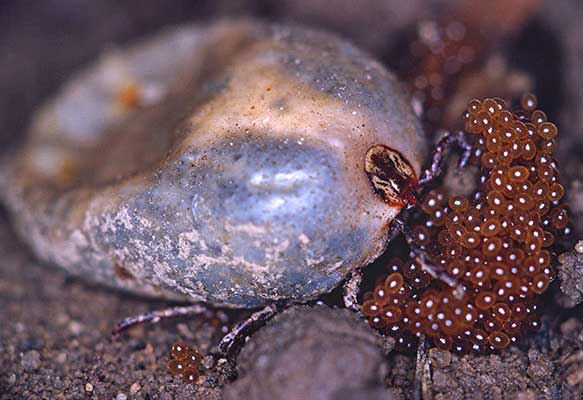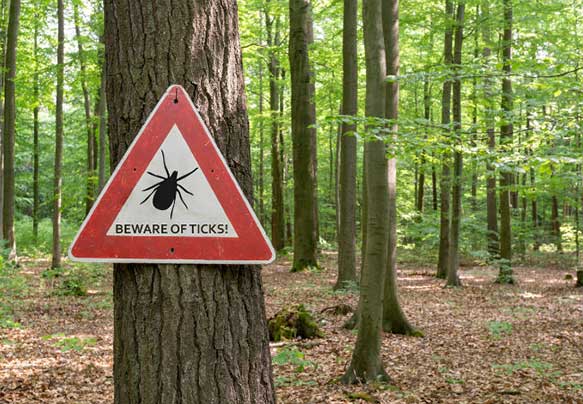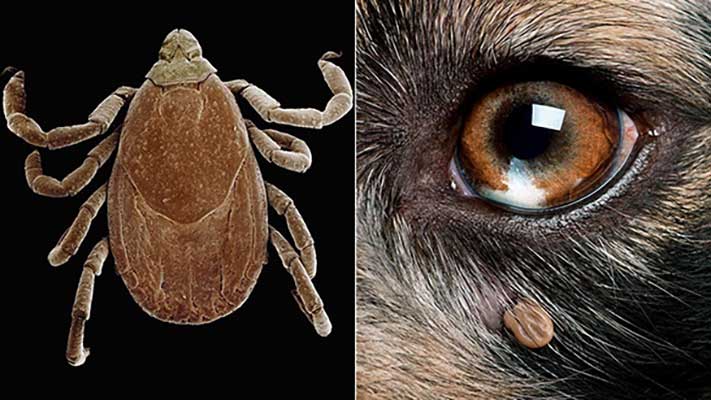And how to prevent them from getting in your yard
Ticks are among the deadliest parasites globally, and they have become a menace and a nuisance to families throughout New York. Many homeowners find themselves asking ‘where do ticks live’ and ‘are they around my home or yard’. While these pesky creatures inflict scary bites that can be painful, the bites themselves are harmless. These parasites, however, can transmit various diseases that can affect your well-being. In fact, the Center for Disease Control and Prevention reports that ticks can transmit up to sixteen different diseases, including Spotted Fever, Rocky Mountain, and Lyme disease.
So, how do these creatures get into your yard or home, considering that they can’t fly or jump? Let’s start by looking at tick habitats to help you understand how these creatures get there.
How Do Ticks Get To Your Yard?
Knowing the kinds of environments that ticks love and how they get there can help limit your exposure to them and give you an idea on how to control them. Typically ticks live in moist and humid areas. They tend to reside close to their hosts. While there is a misconception that ticks live on their host, this is not true. Ticks take refuge in areas near good hosts, and only attach to the host when they want to feed. Once they get their rightful share of blood, they detach and find a new spot to lay eggs or hide until they need a new host.
What is not common is to see ticks inside a house, but the brown dog tick is known to reproduce indoors.
The places you’re likely to find ticks outdoors include:
- Naturalized or unmown yards with tall grasses and weeds
- Low-lying and overgrown shrubs that cast extensive shade
- Foundation plants that are unkept
- Long grass or lawns left unattended allow ticks great hiding spots
- Ticks hide under piles of wood
- They may also live in highly vegetative areas such as forests and bushes near a home
If you discover that you have a tick inside your house, on your skin, or on a pet, there is a high chance that it latched onto the fur, skin, or clothing when you were relaxing in the yard.

The warmth, humidity, and shade provided by piles of wood, unmown grass or low-hanging branches, and sagging branches offer an ideal habitat for ticks, but where do these parasites come from in the first place?
Ticks don’t just appear from thin air. They are carried to your home or lawn by a host. If your property or the surrounding area are readily accessible to various animals and creatures, they are most likely the ones bringing ticks into your yard.
A single host typically doesn’t drop many ticks at a single time to cause widespread infestation. Often it is a single tick that falls in your yard and finds excellent conditions (shade, warmth, and moisture). Then it lays its eggs, bringing forth new generations that will need blood to grow. Some of the animals common to upstate New York (from Niagara Falls to Albany) that may bring ticks into your property or yard:
- Deer – Considered to be the primary source of pests in the yard
- Stray dogs
- Raccoons
- Cats
- Rodents such as mice
- Birds
- Livestock
Finding or eliminating these wildlife from your yard can get rid of some of the factors when assessing “where do ticks live?”
During What Period Are Ticks More Active?
In some areas, ticks may stay active throughout the year. They tend, however, to be highly functional between March and November, and lay low in the other months. If your yard looks more like a tick habitat during this period, you must start being vigilant. Check for ticks in your kids’ clothing or under the pets’ fur after they play in the yard. Check your clothes for ticks once you’re done gardening or after spending time in the nearby bushes.
How To Prevent and Get Rid of Ticks in Your Outdoor Space and Yard
Now that you understand how ticks land in your yard, where they usually hide, and when they are active, the remaining part is to know how to control and get rid of them once and for all. Here are some of the tricks you can use to exterminate ticks from your yard.
1. Erect a Fence
The first thing you should do to keep away ticks from your property is to construct a fence. This barrier will help keep out deer, raccoons, stray dogs, cats, and your neighbors’ livestock. A wall will prevent the parasites from entering your compound in the first place.
2. Tidy up Your Lawn
Overgrown grass has proven to offer a conducive environment for ticks to hide and reproduce. Destroying the tick’s habitat can drive them away, thereby minimizing exposure. Cut your grass short, rake it, and compost it with leaf litter.
3. Get Rid of Rotten Piles of Wood
Since piles of wood are considered a conducive environment for ticks, you must keep wood in a dry and covered area. If that is not possible, keep the piles of timber far away from your house.
4. Trim Overgrown Shrubs and Prune Low-hanging Branches
Overgrown shrubs and trees with low-hanging branches can create an ample environment where these pesky parasites can hide. Pruning and trimming these areas can help destroy the tick’s habitat.
5. Fill your Garden or Lawn with Plants That Repel Ticks
Several plants act as tick repellents. If you want ticks to avoid your address, have these plants in your garden or along the peripheral of your yard. These include:
- Chrysanthemum cineraria folium
- Garlic
- Lavender
- Sage
- Eucalyptus
- Geranium
- Pennyroyal
- Catnip
To Find Out More Of Where Do Ticks Live: Call a Professional Tick Exterminator Near You
Suppose your efforts to remove ticks from your yard don’t work – you’ve got to then involve the professionals. The best exterminators will help you identify locations where chemicals or other tick control products should be applied. They will then provide insights on how you can protect your yard from these parasites. With the help of an exterminator, you can be sure that no tick will be left in your yard.



